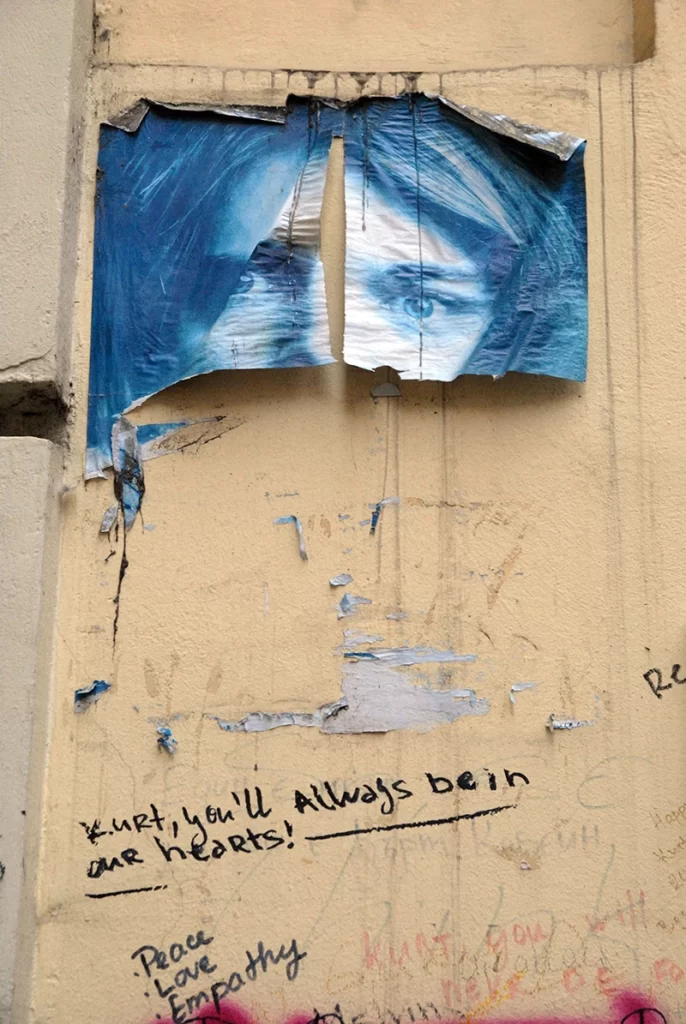
By our very nature, we’d be the last to contemplate who we are. We’re the generation that takes care of itself. The “Latch-Key Kids.” “The Invisible Generation.”

But as we make our way through life, I feel like picking up an old phone receiver and calling you.
How is life? What’s it all about? Did it get us? Who is “us” anyway – what really defines us other than the random occurrence of being born at a particular time? What do we think of it all now that we’ve been here a while? What happened to the world that shaped us?
Most importantly, are we still alive inside?

This is a beginning of something. It started as a general wondering in a vacuum, which slowly evolved into a tapestry of conversations with friends and strangers. This is a rough compilation of some of them, and will continue to shape into whatever it chooses to be. It is too early to tell, but certainly it will be a collage of many different voices, images, memories, and paradoxes. For me so far it has been healing and cathartic to explore this, and I am grateful to every person who contributed their thoughts, feelings, and impressions.
I joined this ride late and had to start over from zero as a teenager. New language, new culture, an entire new world to understand at an age which is daunting in itself. Dropped right into the thick of it – my generation’s formative years. Like jumping onto a train that’s going a hundred miles an hour. Because of this, I’ve never achieved a definitive sense of context, but rather it has been a constant study. For now this conversation only covers the American part of my life and my American friends. (For Eastern European kids life went quite differently, and though surely there are many commonalities, these are conversations I haven’t yet had. Same goes for the rest of the world.)
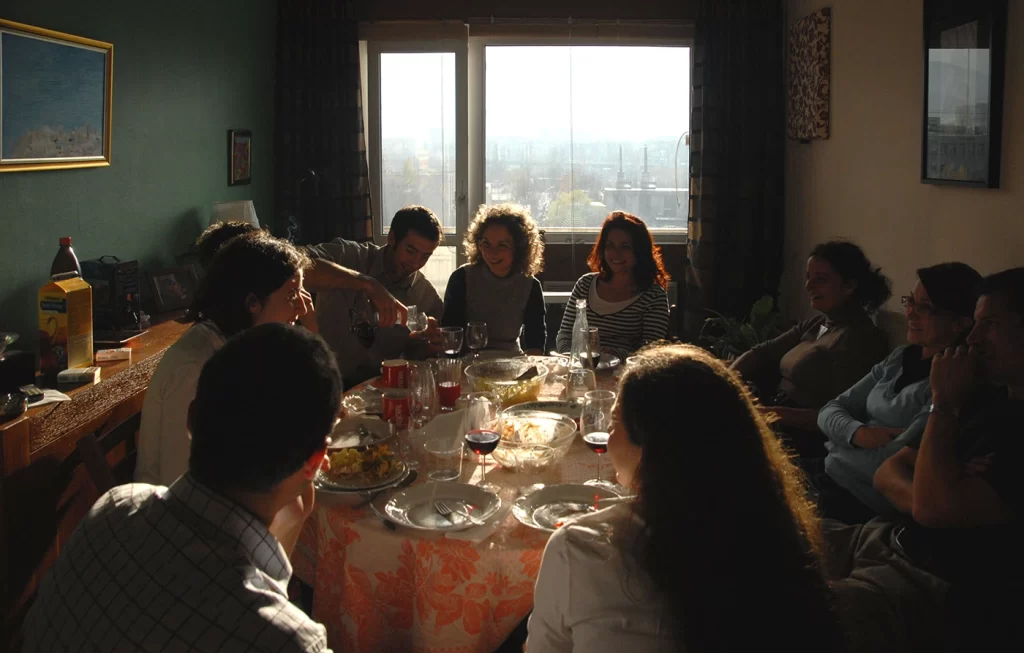
“The Burnout Generation.” “The Lost Generation.” “The Independent Generation.” “The Last Generation.” “The Weird Generation.” “The Invisible Generation.” “The TV Generation.” “The Forgotten Generation.” “The Baby Busters.” “Misfits.” “The Analog Generation.” “The Rebel Generation.” “The Depression Generation.” “The Empathic Generation.” “The Wild Generation.” All these terms and many more I came across while talking to people and looking through original media reports about what we loosely define, (because it has changed several times,) as Generation X.
“I feel like I was jumped into a gang, being born into Generation X.” says G.
Our high priests died young, bright shooting stars in a hard world. This is a terrible thing because it left us without our spirit fire in human form, but it’s also a wonderful thing because this way they remain forever alive, forever young, and forever true. Sacred. We never have to see Kurt Cobain shilling for a corporation, or Layne Staley hocking trinkets at us. We never have to see Tupac cozying up to presidents and oligarchs, or Jeff Buckley using the latest hashtags. Our purehearts remain pure in the ether of our consciousness. “They died young but they taught us to live,” says MB. They are suspended out of time and space, above the fray, to light our fire and remind us who we are. It’s up to us down here to be the keepers of the spirit and make our way through the world with the light of that flame.
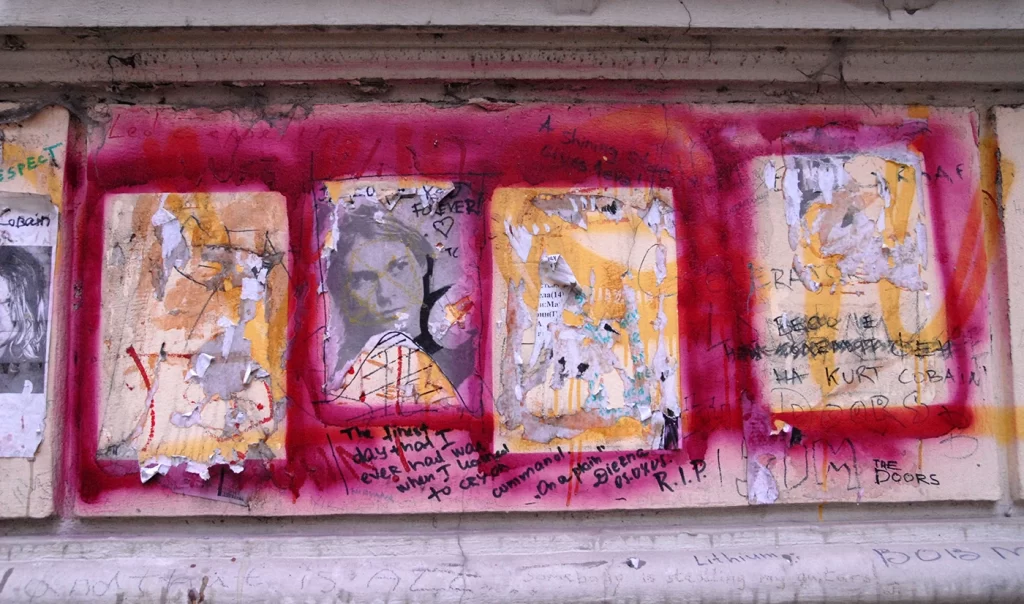
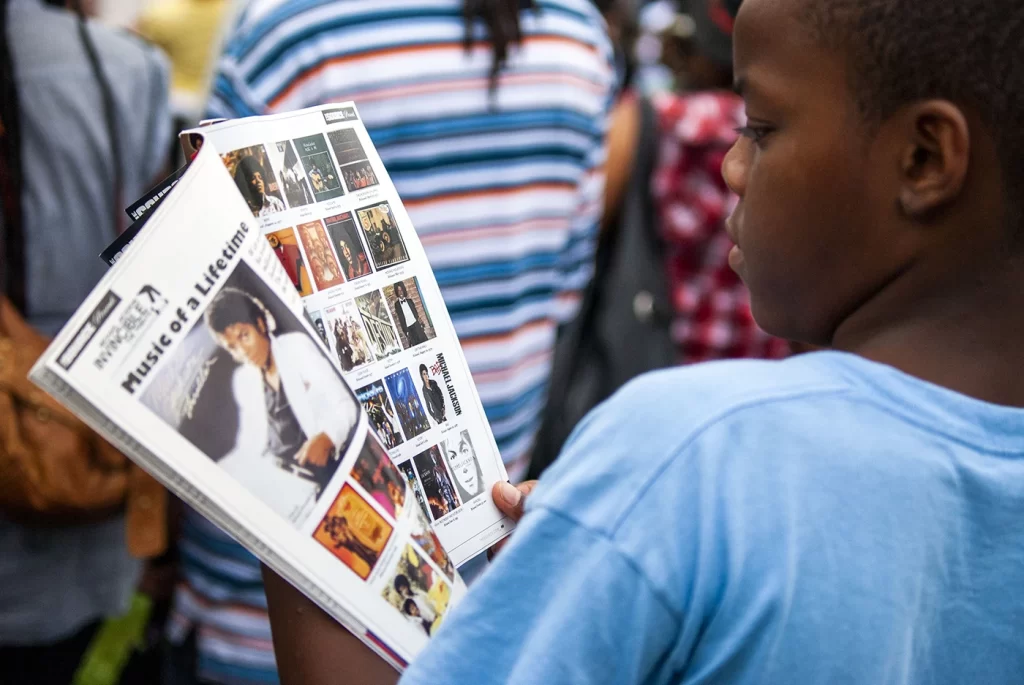
Most people I spoke with answered instantly and defiantly, when asked what generation they perceive themselves to be: “Generation X.” For those of us on the tail end of it there is a slight confusion about who we are exactly. At the time I first became aware of this concept, we were referred to as “Generation Y.” Since then, that term has disappeared. Some say “X-lennials,” others call us “in-betweeners,” I even heard the unfortunate term “Geriatric Millennials.” We are the runts of Generation X, our glorious older siblings who often raised us.
The ones that come right after, who are technically “Millennials” but don’t easily identify with the term, seem comfortable under the wing of Generation X. Some are connected by marriage, others are siblings and friends, and collectively appear to be an object of empathy and protectiveness from their older counterparts. The lines between generations are always blurry.

“We lost before we even got in the game.” – DK

“We are survivors and creators and dreamers. We had to become escape artists in our minds.” – G
The most common word that comes up in my conversations is “resilient.” The next most common word is “creative.” Art, music, movies, dance, new forms of expression being born, an explosion of creativity marks this generation. Almost everyone I’ve spoken with points to music and movies as major factors having shaped them, before they mention their parents. Everyone lists independence as a core defining characteristic. According to many of my friends, this is a response to trauma, boredom, and being left to fend for ourselves.
“It’s ten o’clock. Do you know where your children are?”




LP writes: “I think Gen Xers are the bridge that ties two very different generations together and truly witnessed the end of an era. I think we also experienced a very sad depressing time that has led to the loneliness epidemic. For a lot of us – growing up in the 70s-90s meant having absent parents and family connection. This led to living in survival mode and becoming overly independent.”

For immigrant kids this blend of independence, loneliness, and personal responsibility comes from a different angle but in a parallel way: we had to quickly learn and become interpreters and guides to our parents about how the New World works. The school system, the administrative stuff, and generally the way things are done here. We had the advantage of learning English more quickly and easily because we went to school, and of absorbing general know-how from our young American friends. All of this created a trauma bond with our parents but at the same time a gulf between us and a clash of “New vs. Old World ways.”

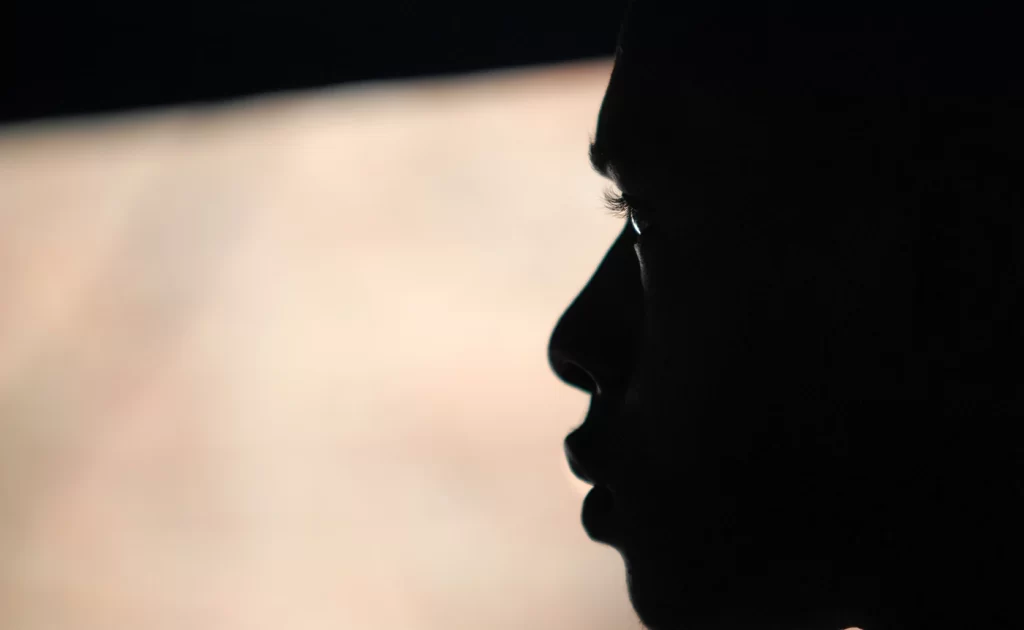
We’re the first generation born of the high divorce rate and the uncounted but high rate of all marriages being kind of bad. To us, divorce is normal and beats a bad marriage any day. In a way, our parents liberated us in our own relationship building. We are more honest with ourselves than they could be, and more open in communicating with others. Our personal value system tends to be the most influential factor in how we form relationships. Most of us had working parents growing up and many of us had single parents, so we mostly raised ourselves. Or our siblings did. In any case, TV and pop culture did. A friend tells me of watching her brilliant mother struggling in a bad marriage and working awful jobs to feed a family. “She knew Latin, for God’s sake.” Another friend tells me of his mother, a talented jazz singer, who only ever sang at home. In her “normal life” she was a cashier and a teller. “I think it slowly killed her soul.” Many people speak in one way or another of that great pain and empathy for their beautiful parents, often caught in various traps. I think we are all in many ways a reaction to that, and live our lives searching for how it can be different.


“I feel as though we are grittier, less emotionally self-involved (than the following generations,) and inherently have a distaste for authority. We are also a tougher generation when it comes to the playground of life, being willing to suffer as part of the process.” – MV
Or, as my friend MH says with an edge to her voice and a glint in her eye, “we aren’t fucking pussies.”

In many ways we are the peak generation. We were conceived and born in a time of optimism, looking forward, expansion, and development. (It was largely a fake unsustainable world we rejected and rebelled against, and at the same time all kinds of terrorism came to be a regular part of life.) Nonetheless, the train had momentum and the wheels were still on. Right up until midlife. The second half of our lives seems destined to be lived in a time of decline, strife, collapse, depression, and pessimism.
In this way we have a most interesting vantage point. What it was, what it could have been, and what it is.
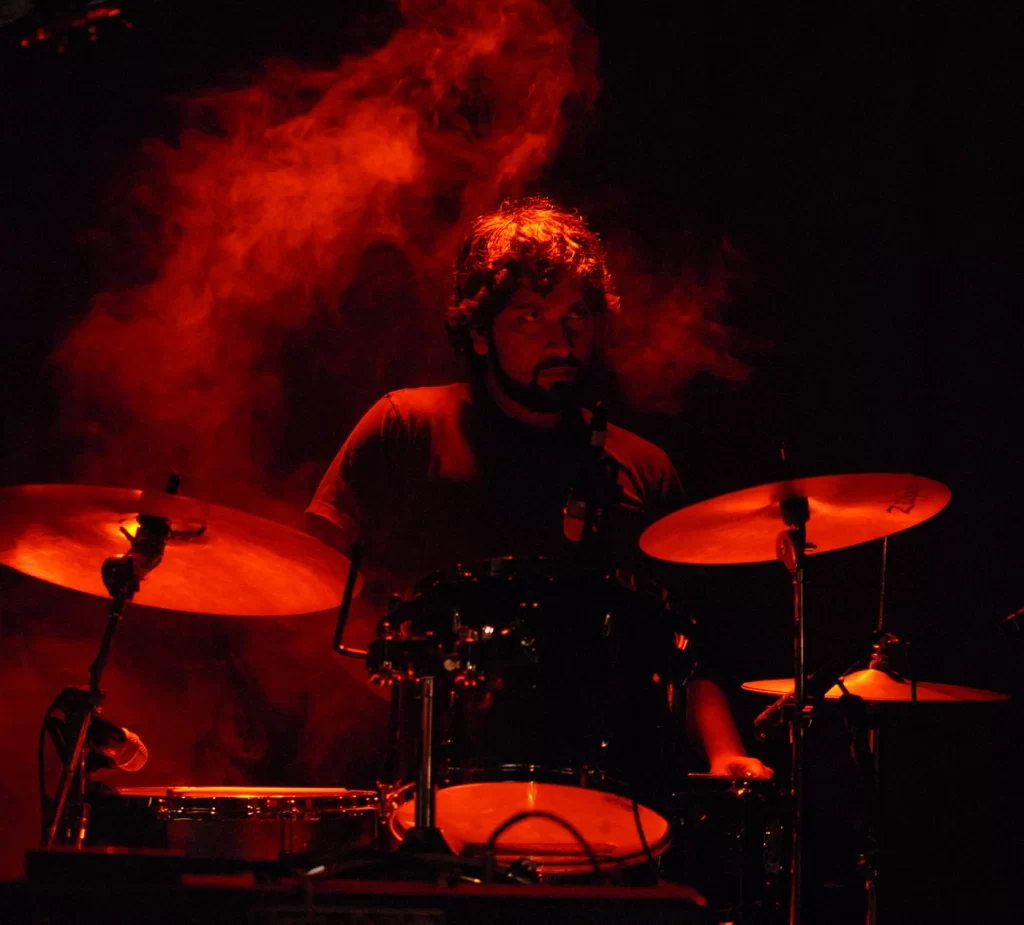
“Our parents fought for our civil rights and in Vietnam. Our parents attended Woodstock and wanted free love and equal rights. Our parents dreamed of and fought for the American dream and we are the generation that built it,” says G.

Part of what everyone has held sacred in all of my conversations is the openness and permeability of Generation X. We are the first truly un-racist and un-sexist generation, having fully internalized the explosive experiences of the 1960’s. It was distilled through our parents’ lives and shot directly through the umbilical cord to become a part of our cells.
Many other common prejudices too didn’t take hold with us. We’re the first generation among whom it is truly accepted to choose to have or not to have children, with equal value placed on either choice. “Live and let live” is in our DNA, and in my conversations it has often been referenced as the highest value.

In our movies the corporate climber, the striver, the sell-out, the arivíste, the financier, the lackey, the conformist, the guy with the nice haircut, is usually the bad guy. Or at least the one inherently unrootable. Sure, in real life among us there are many who have taken these paths, and many more. But at least they are somewhat embarrassed of it and keep it fairly discreet. Usually clothed in good reasoning and a respectable alma mater’s insignia.
In our formative years we had the privacy of thought that simply does not exist for anyone after us. We had the time necessary to question, to reflect, and to reach our own inner knowing and positions based on our own observations and experiences. We may be the last generation for whom “friend” means someone you share adventures, affection, and loyalty with in real life, and “to like” means an ethereal inner process of finding delight in something. We had the opportunity to go through these processes in the private space of our minds. We still carry the knowledge of what independent thought feels like on the inside.
It couldn’t have occurred to us at the time what a luxury that was, but we know it now. Not long behind us comes the Borg Collective.


Part of Gen X’ shadow is that it was conceived in a time of relative opulence and comfort in the United States, and was never taught the good lessons of austerity. Our parents embraced TV dinners, single-use plastics, and cheap disposable goods. We have inherited this wastefulness and it is entirely ingrained into our lives. No one ever told Gen X kids to turn off the faucet while they soap up the dishes, or to re-use zipper bags. This, along with the ramped up production of disposable goods that coincides with our lifetime, has produced a hugely and casually wasteful group of people.
The self-loathing which always felt to me an inherent part of kids in our generation seems to have largely evaporated by now, at least in my conversations. There is a sense of our lack of legacy, which I think is to be expected from a generation that never had an entry point into the established power structures other than being born into them. NP writes: “I look at Gen X as being the biggest disappointment. So many amazing things came from that generation yet it yielded little long term influence culturally and politically.“ But mostly, I sense an affection and a camaraderie among people who perceive themselves a part of Generation X, and an appreciation of the good sides of being outsiders.


“I love us,” says G. “I think that we are the forgotten generation because we spent so much of our youth surviving, and creating, and trying to live.” “We were left alone, and we actually learned how to hang out with each other and do things together.” “We are the people who know how to talk to people. We talk to children, we talk to old people, we teach those that come behind us how to think for themselves.” She continues: “I think we are burned out as a collective (from the anxiety of) what will happen to us.”
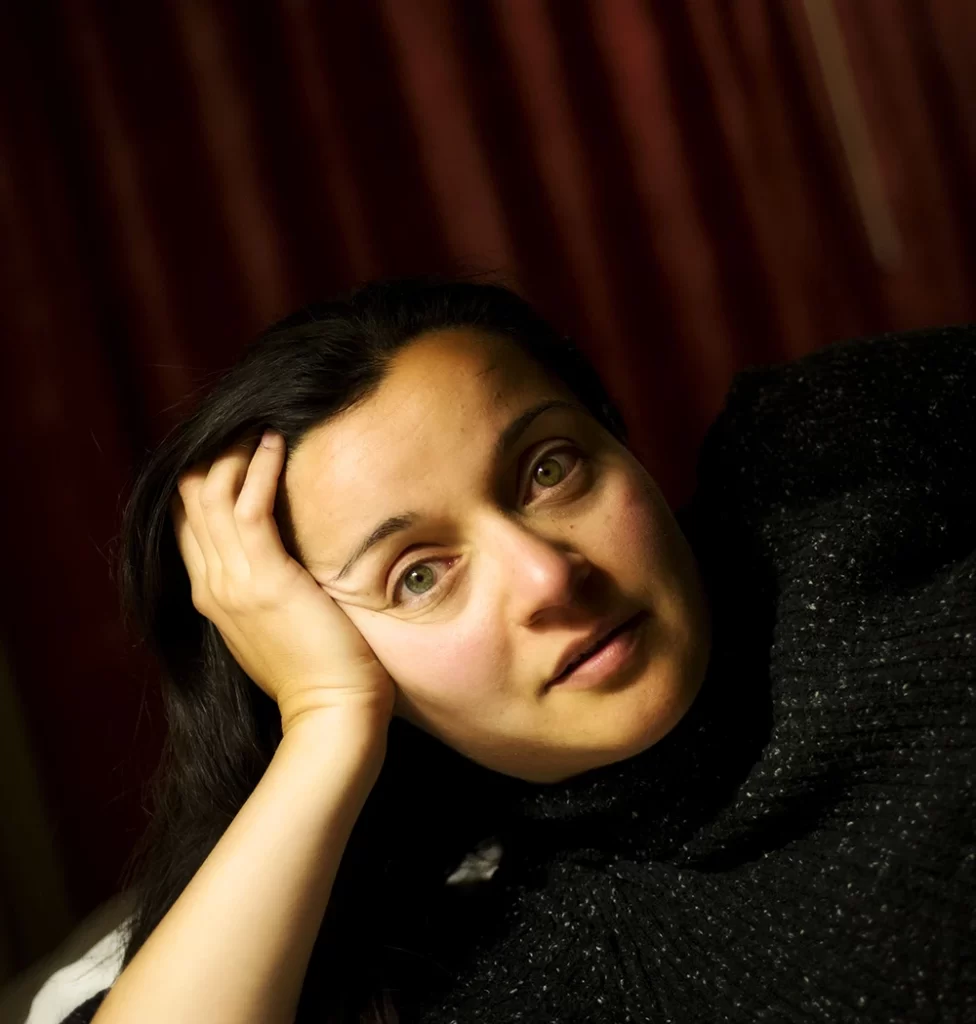
Looking back at media from the 80’s and 90’s, this crop of kids was quite mysterious to the world of adults. Perhaps threatening and intimidating in our rejection of consumerism, conformism, and all of those neat little values that promised, in exchange for our souls, to maybe yield to us “a nice house in the suburbs one day.”
In my first impressions of feedback from that time, the sense was that this generation was automatically viewed as somehow being “bad kids.” While there have always been designated “bad kids” in history, it feels to me that Generation X was given this overall flavor from the beginning. And it also seems to me that Gen X didn’t mind. The response was indifference. When Gen X were twentysomethings, people on TV called them “twentynothings.” Slackers. Lost. Drop-outs. There was the “satanic panic” of the 90’s, too. There were sharp, unflinching movies of rebellion that kids massively connected to, while rejecting the mainstream constructs pumped into their parents’ living rooms with predictable voices at precise times every day.
Maybe in response to that resistance, this is the first generation who began to be drugged as children, with the consent of their parents, for their feelings.

My friend watched the Challenger explode in her homeroom, with her entire class. Every homeroom in her middle school watched it live on televisions specially brought in for the occasion, and so did almost every other kid in America. Kids also watched the Iran Contra scandal unfold, the Iran-Iraq war, the War on Drugs, the Crack Epidemic, the AIDS epidemic. They watched prison grow into a powerful industry around them. When I came in and joined them on this ride, we saw Rodney King be brutalized and LA burn, Waco burn, Heroin and the Grim Reaper start making house calls among our friends, the first WTC bombing, and not too far behind it, the last. Followed by more wars, an ever-shrinking economy with no chance for us in it, more drugs, mass surveillance, and generally the encroachment from all sides on what it means to own one’s own life.
All of this made us disengage even harder from the established beliefs of the world that came before us, and refuse all the more to build a standard future within it.
“We are the last of our kind. The last to remember what it is to be free,” says the stranger on the 6 train who was reading “Einstein’s Dreams” before starting a conversation with me. “And man, WE HAD FUN.”

We are the generation on the backs of whom the marketing arm of contemporary consumerism tried to build itself. Imagine Tom Brokaw’s tinny, condescending voice on the news we never watched, saying: “Generation X: There are lots of them, and they are consumers. They are smart, and television savvy. However, as NBC’s Keith Morrison reports tonight, they represent quite a challenge for Madison Avenue.” How do you market to a generation that sees through you and is not all that interested in your way of life? It’s a matter for debate who won this one – but perhaps we are the most indoctrination-resistant generation. We tend to like making our own things in our own way. And we tend to like thinking for ourselves.


“(For us) interpersonal communication was a preferred method for enriching deeper values for human-kind, and (at the same time) terrorism became a global phenomenon,” writes DM.
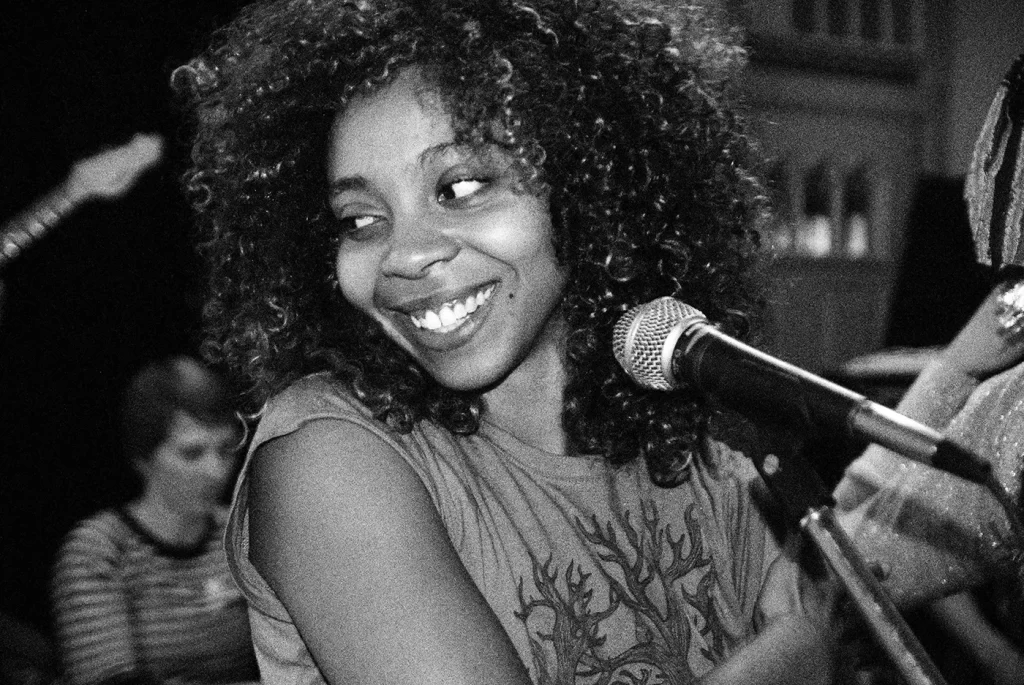
For EL, a strong memory is the interpersonal contact that existed uninterrupted in her childhood. “People spent countless hours sitting around the table, talking, maintaining eye contact all the while. (…) Friends and family memorized phone numbers and phone lines were shared and fought over. Hours were spent making mix tapes on cassette and CD, and video stores were a favorite place.” She continues: “I think my generation is the beginning of a rapid decline in humanity. Plastic became widespread, along with sugary crap that families willingly bought for their children.”
And of course, everyone talks about what came next… What we saw in its origins as a spark of creative genius – the dream and promise of technology unifying the world and making it better for all of us and for our planet, (which I maintain was possible and did exist for a little while,) “turn into a dystopian nightmare of commercialism, self-obsession, garbage, and noise” in the words of SL.
The loss of eye contact is something I have felt most acutely, and many of you seem to feel it too.

“We are the last generation to actually know what good sound is, and the beauty of analog” says NL, a sound man and film lover.




“I often think of Generation X as the last of a dying breed of humans who are equipped and mostly self-sufficient and emotionally capable to cope with various complexities.” – DM
“We have rolled with the times, been reliable in the workplace, can function without our smartphones (mostly,) were lucky enough to experience childhoods/teenage years without social media or regular mass shootings at schools, we have seen the world change and our heroes fall, have had to be responsible for aging parents and children at the same time, yet remain kids at heart, so we’ve done well overall” writes PX.
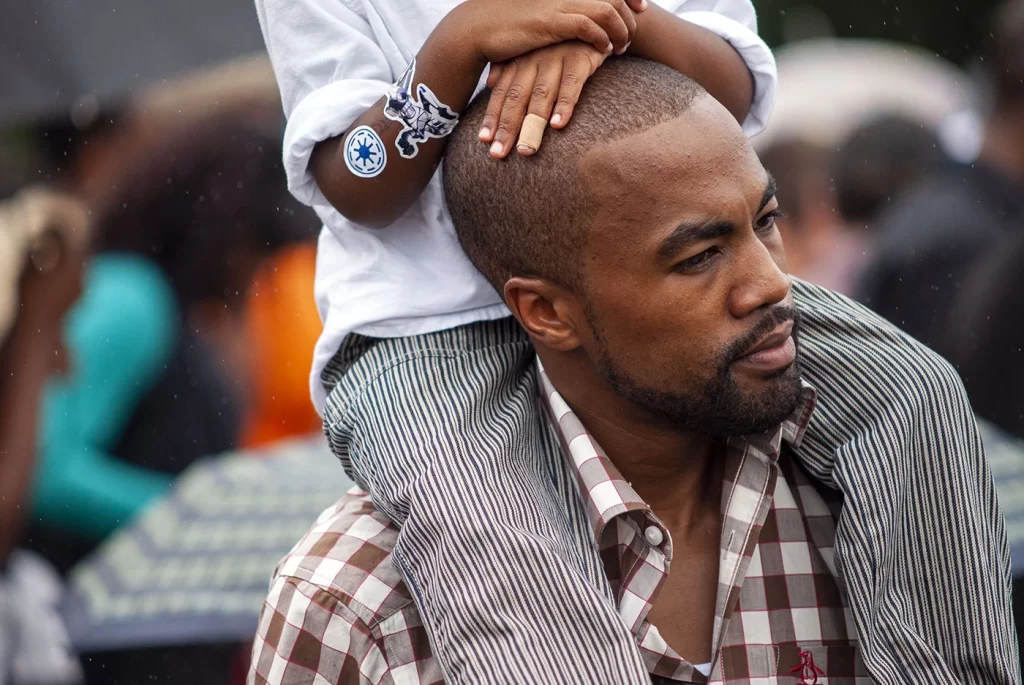
A lack of material prospects seems a defining characteristic of our generation, too. DK refers to us being “screwed over by history,” while AK writes “our generation is a sinking ship financially. No homes, no retirement, no insurance.” People have mentioned aspects of the “Boomer/Millennial War,” a term I never heard before. I.K. writes: “I admire our survival skills, since Boomers held positions of power until Millennials took over, pretty much skipping over us.” Most people have mentioned financial worries, but no one went into heavy detail. Other things such as art, love, and connectedness seem more important – which is perhaps the most binding commonality I have found across all conversations. Somehow, many of us still live as though we don’t care about materialism and conformity.
There is this awareness of inevitability that I have detected among us from the beginning. A sort of unconscious clairvoyance that has been a vital component in creating some incredible, dystopian, prophetic, honest, hilarious, heartbreaking, beautiful art. And that seems to be what we as a generation are proudest of.
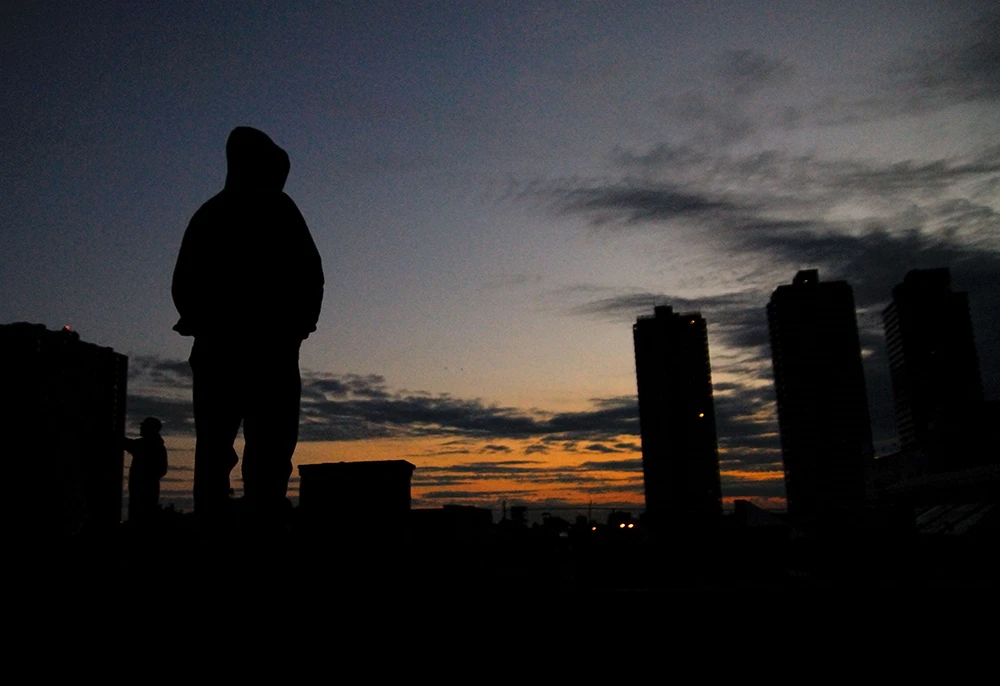
Perhaps my friend Consuela Axel’s college assignment/poem on the subject from that time sums it up perfectly:
Who is Generation X? Generation X is unconditional love. We are the lab results of Woodstock and Freelove. We are the children of Bob Marley, Jimi Hendrix, Bruce Lee, Malcolm X, Martin Luther King, John F. Kennedy and Angela Davis. We are the generation of “Life’s a Bitch and then you die.” We are the generation where “shit happens.” We are the fall out of Vietnam. We are the after effects of West Side Story, Mandingo, Outsiders, The Breakfast Club, and Flower Drum Song. We created Jungle Fever. We are what happens when love is love and color is a word.
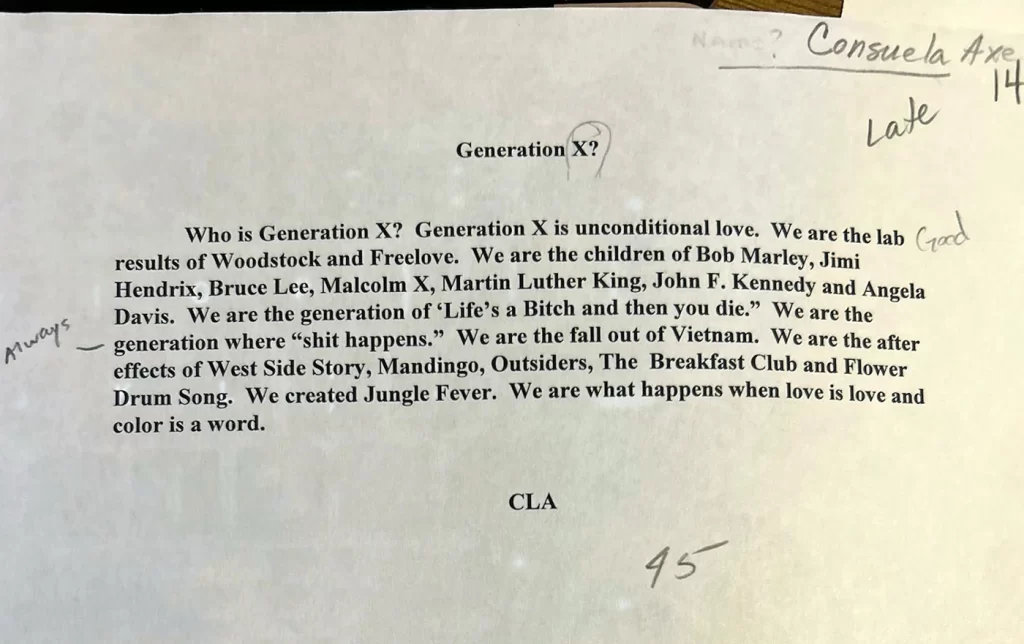
To be continued. If you’d like to join in, please send in your thoughts here:

Stay gold, Ponyboy.